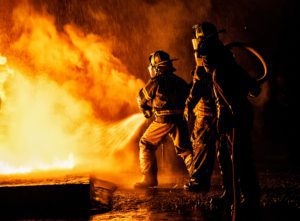JANUARY IS FIREFIGHTER CANCER AWARENESS MONTH
January marks Firefighter Cancer Prevention Month. According to NIOSH (the National Institute for Occupational Health and Safety), firefighters have a 14% higher chance of getting cancer than the public.
Here are some cancer prevention tips for our friends in the firefighting community:
WEAR YOUR P.P.E. AT ALL TIMES
- Wear PPE even after the fire is out, at small fires and during overhaul.
PROPERLY DON P.P.E.
- Properly don PPE at all incidents and ensure crew members do also.
POST FIRE PROCEDURES
CLEAN & DECONTAMINATE YOUR P.P.E.
- Reduce chemical exposure risk by regularly cleaning your personal protective equipment. Studies have shown PPE, neck skin and hand skin are most susceptible to PAH contamination during firefighting.
- Establish policies for mandatory decontamination whenever crews move from the fire ground. This includes:
- Using hose lines to perform gross decontamination of bunker gear and SCBAs
- Providing wet wipes to remove contaminants from all exposed skin
- Switching crews to B-set gear (if available) until contaminated gear can be cleaned
- Ensure all crew members change and wash uniform clothing immediately upon returning to the station and can “shower within the hour.”
- Station policies often include the route washing of apparatus. Similar policies should address the routine washing of hoods and other PPE.
- Ensure personnel are properly trained and use in-station diesel exhaust systems.
- Establish policies for proper storage of PPE and prohibition of it in living quarters.
- Establish and use personnel injury reporting systems to establish records of exposures.
- Advocate for the establishment of, and participation in, ongoing occupational medical surveillance.
TRAINING & TACTICS
- Treat every fire as hazardous materials call—because it is.
- Include smoke hazards at planning and briefing sessions and in fire behavior forecasts.
- If possible, conduct overhaul 45 minutes after fire extinguishment to allow time for toxic gases to dissipate, and ensure all crew performing overhaul operations continue to wear SCBA.
SCHEDULE A CANCER SCREENING
- Ask your doctor if you need more frequent cancer screenings.




